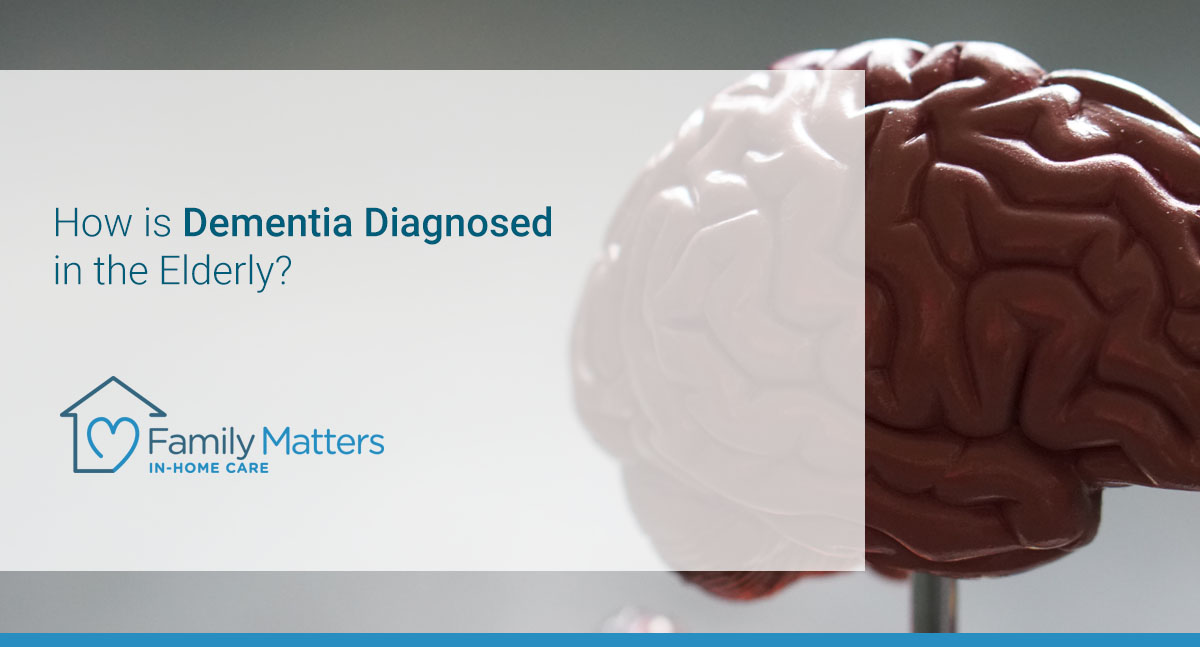
How is Dementia Diagnosed in the Elderly?
Dementia is a condition that’s often misinterpreted. It’s a topic about which a lot of conflicting, inaccurate information circulates. The sad emotions connected with an elderly loved one slowly losing many of their mental faculties can also make the specific nature and realities of dementia hard to understand.
A complex condition that encompasses many different symptoms and behaviors, dementia is surrounded by uncertainty. Indeed, there’s no single test or procedure that offers a clear, unambiguous diagnosis of dementia.
Instead, doctors and medical professionals rely on a series of different evaluations to arrive at a confident conclusion of whether an elderly patient’s symptoms indicate the presence of dementia-related disease.
Dementia defined
Dementia may be considered a condition, but it’s not a disease in itself. It’s an umbrella term that describes the gradual loss of certain brain functionalities—memory, language, thinking—brought on by various, specific illnesses.
Changes in brain structure trigger the loss of functions associated with dementia. The nerve cells (neurons) in the brain of a dementia sufferer stop or slow down communicating with each other. This degeneration results in confusion and impairment in everyday mental activities, memory, emotions, and behavior.
Although researchers estimate that half of all Americans 85 and older suffer from some form of dementia, it’s not considered a normal aging process. Many people live well into their 90’s without exhibiting any symptoms of dementia.
Typical conditions, symptoms, and causes of dementia
Several specific ailments comprise the overall definition of dementia. It’s common for sufferers to experience more than one affliction.
Alzheimer’s disease is perhaps the most common and familiar condition associated with dementia, affecting an estimated 60-70% of all dementia patients according to the World Health Organization. The onset of Alzheimer’s centers on the hippocampus, the region of the brain that oversees memory and learning functions. Loss of memory is frequently the first sign of the disease.
Other diseases or conditions include Huntington’s disease, vascular dementia, frontotemporal dysfunction, thyroid problems, Lewy body dementia, vitamin B12 deficiency, and several more both common and rare.
Signs of dementia develop over time, exhibiting modestly at first and gradually getting worse. Common symptoms include memory loss, difficulty in communication, impaired reasoning, inability to perform complex functions or tasks, reduced visual or spatial cognition, and other behavioral indicators.
The possibility of a patient having multiple, overlapping conditions associated with dementia makes diagnosis difficult. Many known causes—such as depression, organ deficiency, alcohol abuse, and more—are treated independently, which can also make it hard to determine whether they’re signs related to general dementia.
How is dementia diagnosed in the elderly?
There’s no single test that screens for dementia. Rather, the medical professionals making the diagnosis rely on a series of tests and procedures to establish whether an elderly patient has the condition. These assessments are typically performed by neurologists, geriatricians, physical and mental health professionals, depending on what the patient’s family doctor or medical rep decides what’s necessary.
The diagnosis may include some or all these steps:
- Observation. Most commonly those close to a dementia patient will notice a loss of memory skills and motor functions before visiting a physician. A doctor can evaluate those conditions personally as part of the overall diagnosis.
- Medical history. A doctor considers a patient’s behavior, medication history, and timing of the arrival of symptoms associated with dementia. They also study the patient’s family history to determine whether dementia is common among their relatives, both living and deceased.
- Physical exam. Snapshots of a patient’s overall health can provide clues about the development of dementia. A physical examination can involve monitoring of a patient’s blood pressure, tests for heart ailments or kidney failure, and detecting whether they’ve suffered a stroke. A doctor may also decide to treat these conditions independently.
- Cognitive and neurological tests. The patient may be subjected to tests of their physical abilities and brain functions. The tests can include testing for balance, sensory response, reflexes, memory, problem-solving skills, language development, math functions, and more.
- Brain scans and imaging. CT scans, PET scans, and MRI can produce a detailed picture of a patient’s brain and organs. These tests utilize x-rays, radiation, magnetic fields, or radio waves to generate a “map” that can pinpoint certain conditions that may contribute to dementia.
- Lab tests. Technicians may analyze blood and bodily fluids to seek signs of irregular chemical levels, hormonal imbalances, vitamin deficiency, genetic defects, or spinal fluid abnormalities that may be markers of a degenerative condition.
- Psychiatric evaluation. Doctors may analyze whether depression or other mental health conditions are related to the onset of dementia.
No single test is a foolproof, infallible indicator of dementia—even multiple assessments won’t provide 100% confirmation. Because several symptoms can exist at the same time, it’s not always possible that the tests can reveal exactly what aspects of dementia a patient may have. But these assessments can help doctors diagnose dementia with a high degree of confidence and point the way to treatments that can help or improve the symptoms dementia patients may have.
If you or your family member is considering in-home care as part of a plan to age in place, contact Family Matters In-Home Care today for a free consultation. Our team is dedicated to supporting your family and helping older adults enjoy life in the comfort of their own home for as long as possible.
Some of the services offered by Family Matter In-Home Care include: Alzheimer’s & Dementia Care, Bed & Wheelchair Transfer Assistance, Companionship, Housekeeping & Meal Preparation, Personal Care, Recovery Care, and Transportation.
Serving the San Francisco Bay Area and Greater San Diego, Family Matter In-Home Care has offices throughout California including: Campbell, CA, Roseville, CA, San Marcos, CA, and San Mateo, CA.
